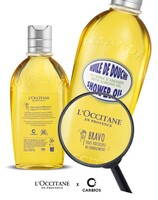- The bottle will be displayed at CARBIOS’ Stand D02 at LuxePack on 4-5 June 2024.
- The production used local PET waste, including colored bottles and multilayer trays.
- CARBIOS' technology reduces CO2 emissions by 57% compared to virgin plastic.
- L’OCCITANE aims for 100% recycled PET in all retail bottles by 2027.

Introduction
CARBIOS and L’OCCITANE en Provence have introduced a transparent PET bottle made entirely from enzymatic recycling for a shower oil from the Amande range. This collaboration with Pinard Beauty Pack aims to build an efficient European recycling sector and accelerate the transition to a circular economy for plastic.
Production Process
The 100% recycled PET bottle was produced using CARBIOS' enzymatic depolymerization process. The production began with the local supply of PET waste, including colored bottles and multilayer trays, to CARBIOS' industrial demonstrator in Clermont-Ferrand, France. The waste was deconstructed into its original monomers, PTA and MEG, and then repolymerized into new PET resins. These resins were blow-molded by Pinard Beauty Pack in Oyonnax, France, and filled with shower oil at L’OCCITANE’s Manosque plant.
Environmental Benefits
CARBIOS' biorecycling technology offers significant environmental benefits, including a 57% reduction in CO2 emissions compared to virgin plastic production. The technology can handle all types of PET waste, including those not recyclable with current technologies, and complements mechanical recycling methods. The resulting monomers can be used to create recycled PET products suitable for food contact and of identical quality to petroleum-based products.
Future Goals
L’OCCITANE aims to reach 100% recycled PET for all its retail bottles by 2027, thanks to CARBIOS' depolymerization technologies. The bottle will be showcased at CARBIOS’ Stand D02 at LuxePack, a trade show dedicated to sustainable premium packaging, on 4-5 June 2024 in Paris.

